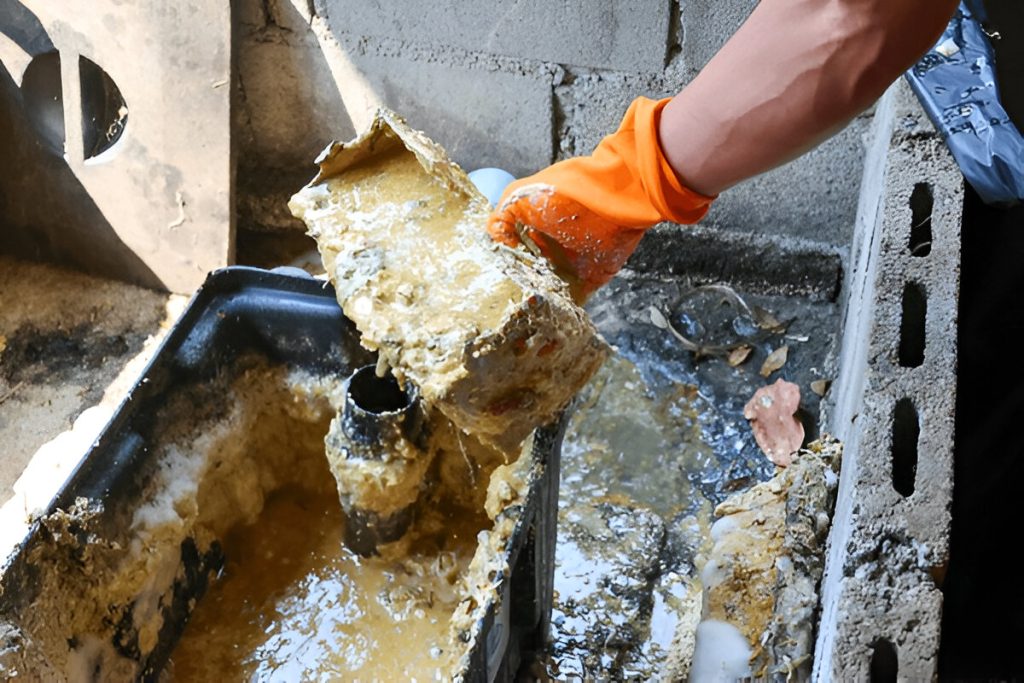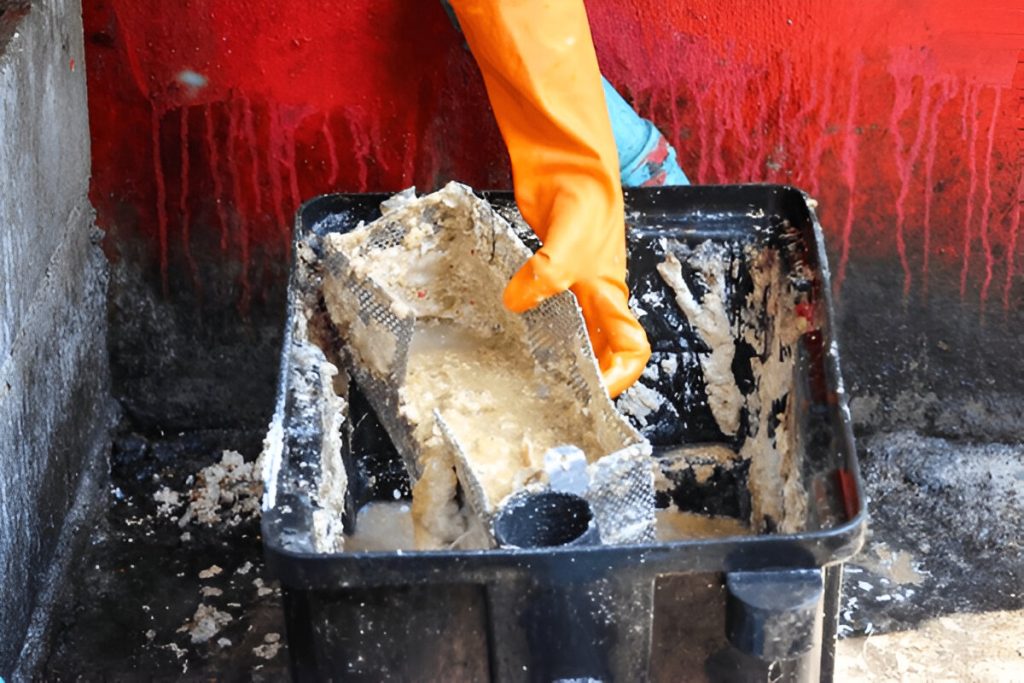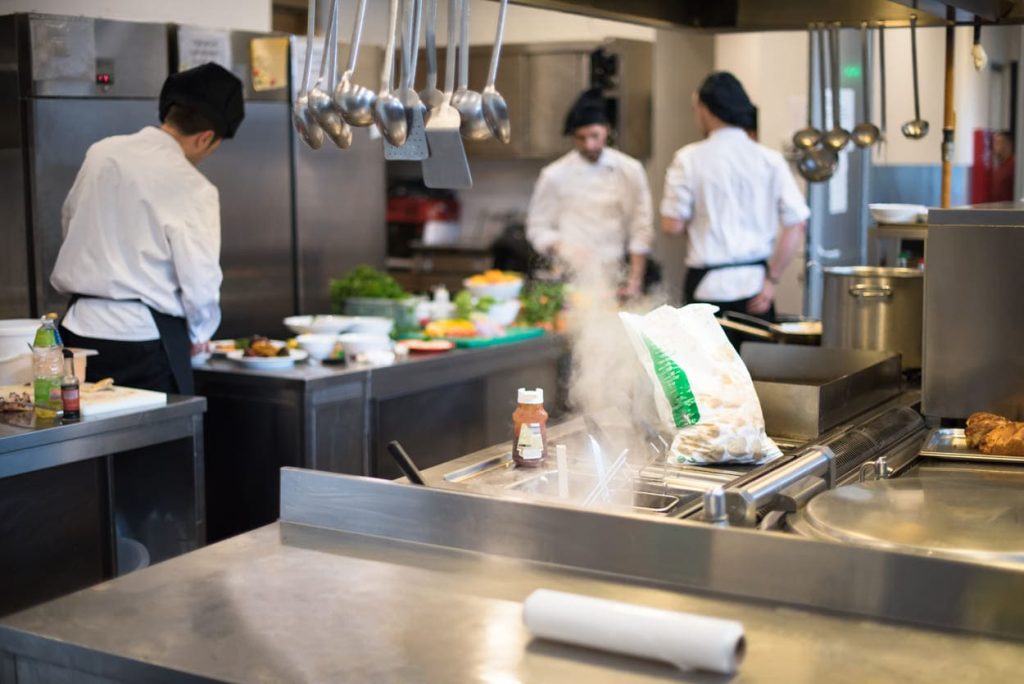Chicago Hood Cleaning
Grease Trap Cleaning in Rolling Meadows, IL
Rated 5 stars on Google

Avoid These Grease Trap Problems in Your Business
If you’re not keeping up with grease trap cleaning, you might be facing some big challenges. Here are six common issues that we help business owners fix—before they turn into major headaches.
Unpleasant Odors
A full grease trap can lead to an overwhelming odor. If your kitchen has a constant odor, it might be coming from a full or clogged grease trap.
Slow or Stopped Drains
A clogged grease trap can cause your kitchen sinks to drain slowly or even back up. Slow drains are a common problem caused by a full grease trap.
Potential Fines and Violations
Grease trap problems can lead to health code violations. A full grease trap can cause costly fines from health inspectors.
Grease Spills into Your Kitchen
When a trap overflows, it can send grease into your floors or drains. It’s not just dirty—it’s a safety hazard.
Expensive Plumbing Repairs
A clogged grease trap can lead to expensive plumbing problems. Fixing that can be costly.
Uncomfortable Work Environment
No one wants to work—or eat—near bad smells and dirty drains. A clean grease trap improves kitchen safety and the overall work atmosphere.
Why Choose Us for Vent Hood Cleaning in Rolling Meadows

Experienced Professionals
We’ve been in the business for years, offering expert grease trap cleaning services. Our team is highly trained to handle grease buildup and prevent common kitchen issues, ensuring your kitchen stays clean and operational.

Health Code
Compliant
We ensure your grease traps are up to code. Regular cleaning prevents violations and fines, so you can avoid costly problems and keep your kitchen in top shape for health inspections.

Prompt and Reliable Service
We understand the importance of keeping your kitchen running smoothly. That's why we offer fast, reliable grease trap cleaning services that won’t disrupt your business. We'll work around your schedule to minimize downtime.

Keep Your Kitchen Running Smooth with Grease Trap Cleaning in Rolling Meadows
As a business owner, you rely on your kitchen to run smoothly. One part of the kitchen that gets forgotten is the grease trap. Ignoring grease trap maintenance can lead to big headaches.
What is Grease Trap Cleaning?
Grease trap cleaning involves removing the buildup of grease and food waste from your kitchen’s grease trap. Grease trap cleaning keeps your kitchen flowing smoothly and meets health codes.
The Importance of Grease Trap Cleaning
Neglecting grease trap cleaning can lead to bigger issues that impact the safety and cleanliness of your kitchen. Regular cleaning helps avoid costly repairs and ensures your kitchen meets health and safety standards.
Top Problems Solved by Grease Trap Cleaning in Rolling Meadows
When you don’t clean your grease trap, it can lead to several problems:
Bad Smells – Grease trap buildup leads to bad smells that fill your kitchen.
Backed-Up Drains – Clogged grease traps cause slow draining sinks.
Health Department Issues – Health inspectors will look at your grease trap. A clogged or overflowing trap could lead to fines or a failed inspection.
Messy Spills – An overflowing grease trap leads to grease spills in your kitchen. It’s hard to clean up, and it can be a safety hazard.
Plumbing Problems – Grease traps cause plumbing issues when left unchecked. Ignoring your grease trap cleaning now could cost you big on repairs later.
Unpleasant Environment – No one wants to work—or eat—near bad smells and dirty drains. Cleaning your grease trap ensures a healthier, safer, and more pleasant work environment.
Keep Your Kitchen Clean and Safe
Our professional grease trap cleaning service in Rolling Meadows helps you avoid these issues and keep your kitchen in top condition. We take care of your grease trap so you can focus on your business. Let us keep your kitchen running smoothly—call us for prompt service.

We Proudly Serve in Rolling Meadows
Rolling Meadows, Illinois is a city with a rich history and a vibrant community that makes it a wonderful place to live. Established in the 1950s as a planned suburban community, Rolling Meadows has since grown into a thriving city with a strong sense of community and an abundance of amenities.
One of the reasons Rolling Meadows is a great place to live is its convenient location. Situated just 24 miles northwest of Chicago, residents have easy access to the city for work or play. The city is also home to top-rated schools, beautiful parks, and a variety of shopping and dining options.
Some of the city’s highlights include the Rolling Meadows Park District, which offers a wide range of recreational programs and facilities for residents of all ages. Residents also enjoy the annual Summer Concert Series, held in the city’s parks, as well as the Farmers Market, where they can purchase fresh produce and handmade goods from local vendors.
We would like to take this opportunity to thank the residents of Rolling Meadows for their continued support and business throughout the years. We look forward to continuing to provide top-notch grease trap cleaning services to our valued customers in Rolling Meadows and beyond.
Frequently Asked Questions
Grease trap cleaning is the process of removing built-up grease, food particles, and waste from your grease trap. This helps keep your kitchen’s plumbing system running smoothly, prevents bad odors, and ensures that your business is up to code.
The frequency of cleaning depends on the size of your kitchen and how much grease is used. Generally, it’s recommended to clean your grease trap every 1-3 months. Regular cleaning prevents overflow and keeps your kitchen running efficiently.
Regular grease trap cleaning prevents costly plumbing problems, bad odors, and health code violations. It also helps your kitchen stay sanitary and safe for both employees and customers. A clean grease trap ensures your business operates smoothly.
Neglecting grease trap cleaning can lead to foul odors, slow or clogged drains, plumbing backups, and even health code violations. It can also create an unhygienic environment, affecting both staff and customers.
The cleaning process typically takes 1-2 hours, depending on the size and condition of the grease trap. We work efficiently to minimize downtime for your kitchen and ensure everything is cleaned properly.
The cost of cleaning your grease trap varies based on the size and condition of the trap. However, regular cleaning is more affordable than dealing with plumbing repairs, health code violations, or a broken-down kitchen.
While it’s possible to clean your grease trap yourself, it’s best left to professionals. Our team has the experience and equipment to safely and thoroughly clean your grease trap, ensuring it’s done right and meets all local codes.
